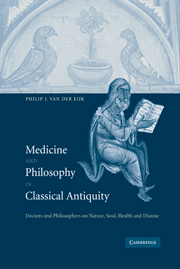 Medicine and Philosophy in Classical Antiquity
Medicine and Philosophy in Classical Antiquity Book contents
- Frontmatter
- Contents
- Acknowledgements
- Note on translations
- Note on abbreviations
- Introduction
- I HIPPOCRATIC CORPUS AND DIOCLES OF CARYSTUS
- II ARISTOTLE AND HIS SCHOOL
- 5 Aristotle on melancholy
- 6 Theoretical and empirical elements in Aristotle's treatment of sleep, dreams and divination in sleep
- 7 The matter of mind: Aristotle on the biology of ‘psychic’ processes and the bodily aspects of thinking
- 8 Divine movement and human nature in Eudemian Ethics 8.2
- 9 On Sterility (‘Hist. an. 10’), a medical work by Aristotle?
- III LATE ANTIQUITY
- Bibliography
- Index of passages cited
- General index
6 - Theoretical and empirical elements in Aristotle's treatment of sleep, dreams and divination in sleep
Published online by Cambridge University Press: 22 September 2009
- Frontmatter
- Contents
- Acknowledgements
- Note on translations
- Note on abbreviations
- Introduction
- I HIPPOCRATIC CORPUS AND DIOCLES OF CARYSTUS
- II ARISTOTLE AND HIS SCHOOL
- 5 Aristotle on melancholy
- 6 Theoretical and empirical elements in Aristotle's treatment of sleep, dreams and divination in sleep
- 7 The matter of mind: Aristotle on the biology of ‘psychic’ processes and the bodily aspects of thinking
- 8 Divine movement and human nature in Eudemian Ethics 8.2
- 9 On Sterility (‘Hist. an. 10’), a medical work by Aristotle?
- III LATE ANTIQUITY
- Bibliography
- Index of passages cited
- General index
Summary
PRE-ARISTOTELIAN VIEWS ON SLEEP AND DREAMS
‘Anyone who has a correct understanding of the signs that occur in sleep, will discover that they have great significance for everything.’ This is the opening sentence of the fourth book of the Hippocratic work On Regimen, a treatise dating probably from the first half of the fourth century bce and dealing with the interpretation of dreams from a medical point of view, that is, as signs pointing to the (future) state of the body of the dreamer. The passage reflects the general opinion in ancient Greece that dreams are of great importance as ‘signs’ (sēmeia) or ‘indications’ (tekmēria), not only of the physical constitution of the dreamer and of imminent diseases or mental disturbances befalling him/her, but also of divine intentions, of things that may happen in the future, things hidden to normal human understanding. Dreams played an important part in Greek divination and religion, especially in the healing cult of Asclepius, because they were believed to contain important therapeutic indications or even to bring about healing themselves. The belief in the divine origin of dreams and in their prophetic power was widespread, even among intellectuals. As a result, dreams were mostly approached with caution because of their ambiguous nature. The Greeks realised that dreams, while often presenting many similarities with daytime experiences, may at the same time be bizarre or monstrous.
- Type
- Chapter
- Information
- Medicine and Philosophy in Classical AntiquityDoctors and Philosophers on Nature, Soul, Health and Disease, pp. 169 - 205Publisher: Cambridge University PressPrint publication year: 2005
- 2
- Cited by


